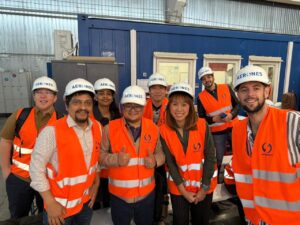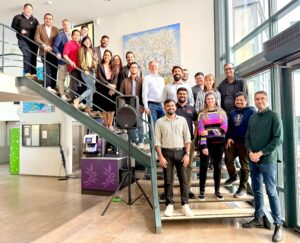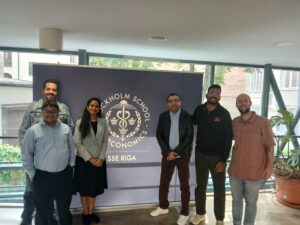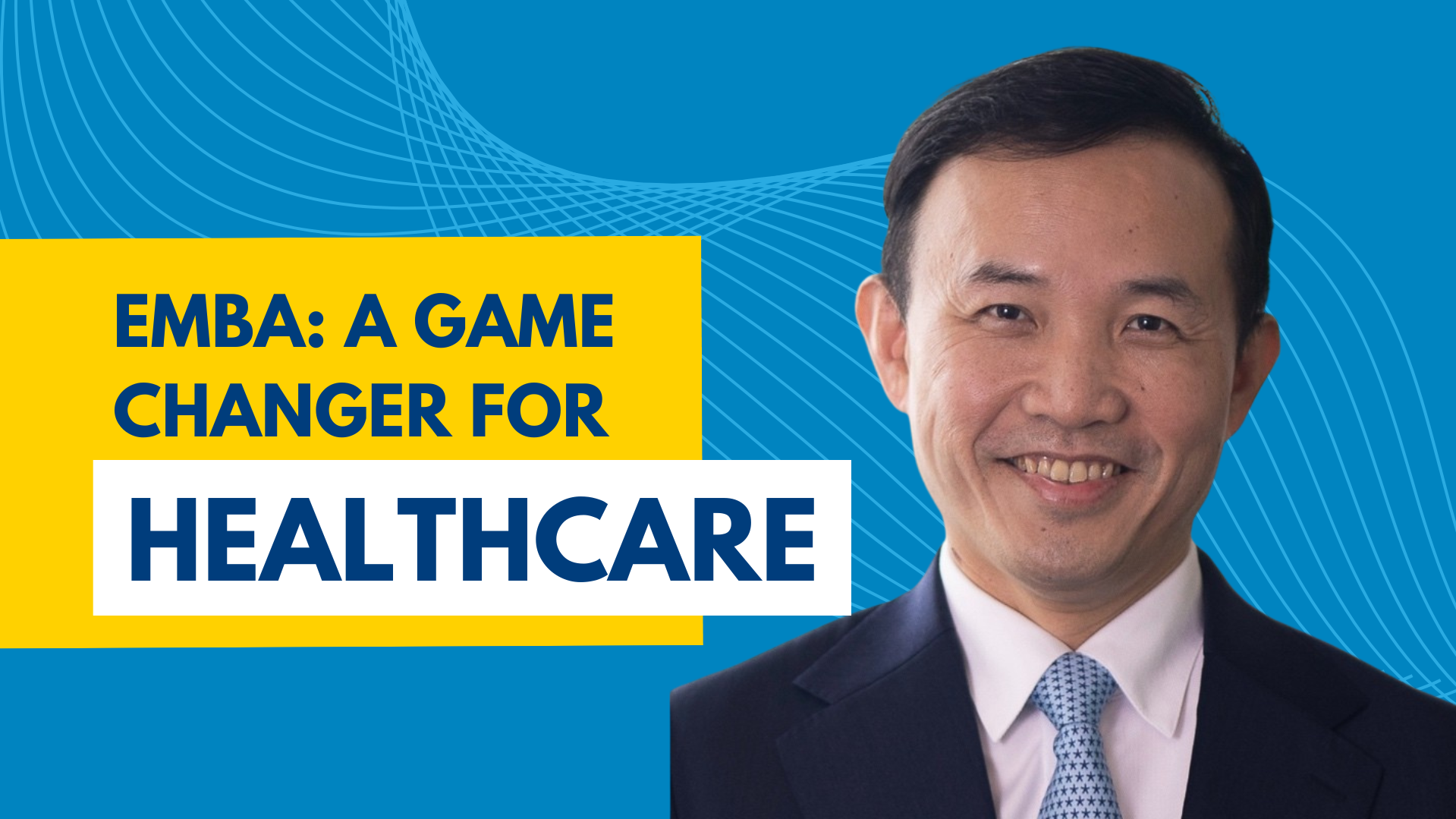Caroline Mary’s Enriching Nordic Exchange Experience
Students have the flexibility to personalize their EMBA experience and broaden their horizons beyond the core curriculum by opting for overseas exchange programs instead of an elective. Caroline Mary, part of the UCLA-NUS EMBA Class of 2025/2026, exemplifies this through her participation in a short-term exchange at the Stockholm School of Economics. Her experience traveling across the Nordic region—visiting innovative companies like Aerones, engaging with diverse peers, and immersing herself in new cultural and business environments—has significantly shaped her global outlook. In this article, Caroline shares how this enriching journey helped her develop strategic insights, foster cross-cultural collaboration, and deepen her understanding of international markets.
1. What made you decide to go on a short exchange as an elective and why this particular one?
Exploring new regions through immersive learning has always been part of my development journey. What made the GNAM (Global Network for Advanced Management) week at the Stockholm School of Economics (SSE) particularly compelling was the chance to engage with the Nordic region, a part of the world I had not experienced before. SSE’s reputation as the top-ranked business school in the Nordics, combined with its focus on innovation and strategic thinking, made it an ideal setting to explore how smaller economies approach global challenges.
To deepen that experience, I also spent time in Denmark, Sweden, and Norway. A standout moment was the visit to Aerones, a Latvian robotics firm that demonstrated how ingenuity and focus can enable small players to compete globally.
This elective aligned perfectly with my intent to continue growing as a global thinker, applying strategy in unfamiliar settings, and learning from diverse perspectives. It also gave me a chance to apply and build on the leadership and collaboration skills developed through my current program skills that continue to prove essential in complex, international environments.
2. In your perspective, what are the advantages of going on such exchange trips?
From my perspective, short exchange trips offer several distinct advantages both academically and personally.
First, they provide a compressed yet immersive experience. Within a short span, you’re exposed to new academic frameworks, regional business models, and diverse viewpoints, all of which sharpen your analytical and strategic thinking in real time.
Second, they simulate real-world global collaboration. Working in diverse teams under time pressure mirrors the demands of today’s international business environment where aligning quickly, communicating across cultures, and delivering results with agility are non-negotiable skills.
Third, they offer contextual learning. Visiting companies, engaging with local professionals, and observing consumer behavior on the ground give you a sense of how business is shaped by geography, history, and culture.
Finally, there’s immense personal growth. You become more adaptable, self-aware, and open to different ways of thinking. Whether through structured activities or unplanned moments, like navigating a new city or sharing a meal with classmates. These experiences stretch your comfort zone and leave a lasting imprint.
In short, these exchanges are far more than academic electives, they are high-impact experiences that build both competence and character.

3. Please expand on the activities during this trip. Describe the class experience, networking, out of classroom activities, overall trip.
The GNAM week at the Stockholm School of Economics was thoughtfully designed to offer a rich mix of academic learning, peer interaction, and cultural exploration. The classroom sessions were engaging and fast-paced, focused on platform strategy, business models, and how companies create and capture value in digital ecosystems. What stood out was the practical orientation case discussions, frameworks like the value stick, and tools such as the F.R.E.E. acronym made the content highly applicable. The faculty created an environment that encouraged debate and perspective-sharing, drawing out insights from a truly global classroom.
Group work was central to the experience. Being placed in diverse teams demanded rapid alignment, clear communication, and mutual respect. Navigating different working styles and perspectives under time pressure was a rewarding challenge and a highly authentic simulation of what it’s like to operate in multicultural, fast-paced business environments.
Outside the classroom, the program included a company visit to Aerones in Latvia, a cutting-edge robotics firm. This was a definite highlight. We toured their corporate office and manufacturing facility and saw firsthand how a small company is using innovation to compete globally. It brought to life many of the themes we had discussed in class, particularly around resourcefulness, scalability, and strategic positioning.
Networking was organic and energizing. Whether during lunches, breakout groups, or casual evening meetups, the interactions with peers from across the GNAM network were a big part of the experience. Every conversation – formal or informal – offered a new lens through which to view a problem or opportunity.
Beyond the structured activities, I made it a point to explore the region, spending a few days in Sweden, Denmark, and Norway. This personal extension of the trip helped bring classroom insights to life. Walking the streets of Copenhagen, trying out local street food, shopping in a supermarket in Oslo, and exploring the famous bridge connecting Denmark and Sweden all added rich layers of understanding about the cultural, economic, and social fabric of the Nordic region.
Overall, the trip was a multidimensional experience. Academically enriching, professionally relevant, and personally meaningful, it pushed me to think more globally, collaborate more effectively, and reflect more deeply. It was a perfect reminder that growth happens not just in structured settings, but in every conversation, every challenge, and every new place you step into.

4. What were the takeaways?
The GNAM week offered several powerful takeaways (both conceptual and personal) that I will carry forward in my career and outlook.
A standout was the Value Stick Framework, which provided a simple yet powerful lens to evaluate how companies create and distribute value among stakeholders. Concepts such as willingness-to-pay, price, cost, and willingness-to-sell have fundamentally reshaped how I assess business models. I now find myself instinctively applying this lens to almost every company I encounter. It’s a tool that enhances not only strategic thinking but also board-level decision-making.
I also gained a deeper appreciation for cross-cultural collaboration. Although I’ve worked with global teams before, this experience was different. Collaborating with peers from diverse geographies under time pressure demanded quick alignment, active listening, and adaptability, skills that are increasingly critical in today’s interconnected business landscape.
Exposure to regional strategies, particularly from smaller economies like Latvia, offered a fresh lens on innovation and competitiveness. The visit to Aerones underscored how resource constraints can drive focus, ingenuity, and global relevance. It was a compelling reminder that strategic clarity often outweighs scale.
On a personal level, I was reminded of the growth that comes from stepping into new environments. Whether in class, on company visits, or walking through the streets of Riga, Copenhagen, or Oslo, I was consistently challenged to see the world differently. That openness to people, places, and perspectives is something I intend to nurture further.
In short, GNAM week didn’t just expand what I know it reshaped how I think, lead, and learn.

5. Advice for prospective students on elective selection and whether to consider going for these short exchanges with part of their UCLA-NUS EMBA.
When selecting an elective, think beyond just the topic or the host institution’s ranking. Consider the region, the cultural context, and how the experience will stretch you. For me, choosing the GNAM week at the Stockholm School of Economics was as much about learning strategic frameworks as it was about immersing myself in the Nordic region, a part of the world I had never explored before. That added a whole layer of richness to the learning.
Short exchanges are a valuable part of the overall learning journey not because they are uniquely intense, but because they distil the essence of what we consistently experience in this competitive program. The rigor, pace, and collaborative demands are familiar to anyone enrolled in such a program. What makes short exchanges stand out is not the difficulty but the context.
You’re immersed in a fast-paced environment, surrounded by unfamiliar peers from diverse backgrounds, tackling real business challenges, and navigating cultural nuances all within a week. This format forces you to adapt quickly, communicate clearly, and collaborate effectively skills that are critical in any global leadership role.
More importantly, these programs offer something traditional classrooms can’t always replicate – serendipity. A spontaneous lunch conversation might shift your thinking. A group project might surface new strengths. A company visit might spark your next career pivot. The learning goes far beyond the syllabus; it sharpens not only your skills and insights, but also your understanding of yourself and how you operate across global contexts.
My advice? Say yes. Choose a region you’re unfamiliar with. Go in with a learning mindset but leave space to be surprised. Short exchanges may be brief, but their impact is lasting well beyond the duration of the trip.
More information about The UCLA-NUS EMBA Program
Click here to learn more about the UCLA-NUS EMBA program and why it is the program designed for global leaders.
Alternatively, click here to schedule a 1 on 1 zoom call with our admissions staff.


